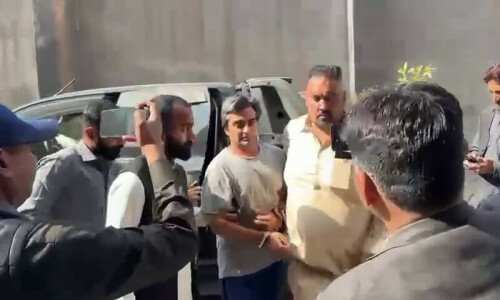
RAWALPINDI: Intelligence officials informed an anti-terrorism court (ATC) on Saturday that suspects in the Mumbai attacks case got training at various centres of the banned Lashkar-e-Taiba (LeT) militant organisation, including navigational training in Karachi.
In their statements recorded before ATC judge Chaudhry Habibur Rehman, five inspectors of the Crime Investigation Department, who are prosecution witnesses in the case, informed the court about the training details and capabilities of suspects Zakiur Rehman Lakhvi (the alleged mastermind), Abdul Wajid, Mazhar Iqbal, Hammad Amin Sadiq, Shahid Jameel Riaz, Jamil Ahmed and Younas Anjum.
The officials were in charge of CID stations in Okara, Bahawalpur, Rahimyar Khan, Mandi Bahauddin and Sheikhupura. They said the suspects, who allegedly participated in the attacks, were trained at the LeT training centres at Yousaf Goth in Karachi, Buttle in Mansehra, Mirpur Sakro in Thatta and Muzaffarabad.
The CID inspector from Okara alleged that Lakhvi was LeT’s ‘operational commander’ who trained other militants. Lakhvi went to Kunar and participated in Afghan jihad against the Soviet forces, he said.
A resident of Renala Khurd in Okara district, Lakhvi was an expert in using firearms and improvised explosive devices. He also remained ‘commander’ of LeT in Azad Kashmir, according to the statement.
The other inspectors informed the court that suspected abettors Abdul Wajid, Mazhar Iqbal, Hammad Amin Sadiq and Shahid Jameel Riaz were also trained at LeT centres and at sea near Yousaf Goth in Karachi’s Gadap town.
FIA’s Special Prosecutor Chaudhry Zulfiqar Ali told the court that the witnesses were responsible officials who had recorded their statements without any pressure. They had no ill-will against the suspects, he said, adding: “It was their job to keep the militants of proscribed organisation under observation.”
Khwaja Mohammad Haris, counsel for Lakhvi, asked the prosecution witnesses whether they had witnessed the suspects getting training at the LeT camps.
The witnesses admitted that they had never visited the LeT places or witnessed the suspects getting training in use of firearms or IEDs and had relied upon the reports of informers.
Mr Haris said the witnesses had no direct knowledge of the involvement of his client in the attacks and had never shared their intelligence with the police officials concerned.
Talking to Dawn, the lawyer said if the statements were true then it showed negligence on the part of witnesses because being responsible officials they did not take any step for closing the training camps. “If they knew that Lakhvi or other suspects were involved in suspicious activities then why they did not put their names in the Fourth Schedule to limit their movement. The prosecution has fabricated a false story against the suspects and the statements of the five witnesses are part of that story,” he alleged.
The hearing will resume on Nov 17.
















































